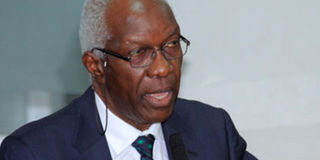Increase resources for school inspection

Auditor General John Muwanga. The Directorate of Education Standards (DES) has only 54 inspectors to run around 8,000 schools across the country to ensure they stick to the set education standards. Photo | File
What you need to know:
The issue: School inspection
Our view: Schools must be inspected regularly and for this to be done effectively, the number of inspectors must be adequate. It is issues such as these that influence the success of our education sector.
Yesterday, this publication ran an article titled, “One inspector oversees 148 schools, says Auditor General”. Mr John Muwanga, the Auditor General, in a three-year value-for money- audit, said the Directorate of Education Standards (DES) has only 54 inspectors to run around 8,000 schools across the country to ensure they stick to the set education standards.
This implied that one inspector ran around 148 schools in the 2021/2022 financial year. The report said in 2020/2021, the number of schools inspected increased to 5,000, with only 56 inspectors deployed. In the 2019/2020 financial year, a total of 4,000 schools were inspected by 46 inspectors, meaning one inspector ran around up to 87 schools. Mr Muwanga said the directorate is underfunded and yet the numbers of schools keep growing every year. Sources at the Education ministry told this newspaper that they aim at one inspector overseeing at least 40 schools. However, this might be a tall order, if the government does not increase funding to the Directorate.
Mr Muwanga, in his report, even said: “Going by the ratios in the three years [under review], if full inspections were to be undertaken as expected, [the ratios] would actually be 1:174 for FY 2019/2020, 1:179 for FY 2020/2021 and 1:296 for FY2021/2022. This demonstrates the magnitude of the staffing challenge at the Directorate.”
He said the audit sampled and analysed 62 schools from 15 Local Governments during the three-year period under review. Mr Muwanga said some schools were not inspected every year as expected. The crux of the matter, as highlighted by Mr Muwanga, is ensuring education standards in rural and urban areas.
“The failure to inspect all schools, as expected, leads to schools dropping their guard in ensuring the maintenance of educational standards, guaranteeing student wellbeing, promotion of equity, provision of professional student development opportunities and enhancement of accountability,” Mr Muwanga said. He recommends, among others, increased funding to the Directorate that has in the past three financial years received 85 percent of allocated monies. Mr Muwanga noted that the Directorate received only 19.6 billion of Shs23 billion approved between 2019 and 2022, and yet the funds were earmarked for supervising secondary schools, teacher education institutions, monitoring local governments, among others. He also said the budget for the Education ministry during the three-year period was increased from Shs305 billion in FY 2019/2020 to Shs403 billion in FY2021/2022 a while that of the directorate decreased from Shs6.91 billion in FY 2019/2020 to Shs5.8 billion in FY 2021/2022. If nothing is done to ensure an adequate number of full inspections is undertaken, he warned that it would “hamper continuous improvement in teaching methods and content delivery, which are critical in effective learning”
Schools must be inspected regularly and for this to be done effectively, the number of inspectors must be adequate and they should have the tools needed to get the job done. It is issues such as these that ultimately influence the sucess of our education sector.
Our commitment to you
We pledge:
- To be accurate and fair in all we do.
- To be respectful to all in our pursuit of the truth.
- To refuse to accept any compensation beyond that provided by Monitor Publications Ltd. for what we do in our news gathering and decision-making.
Further, we ask that we be informed whenever you feel that we have fallen short in our attempt to keep these commitments.




